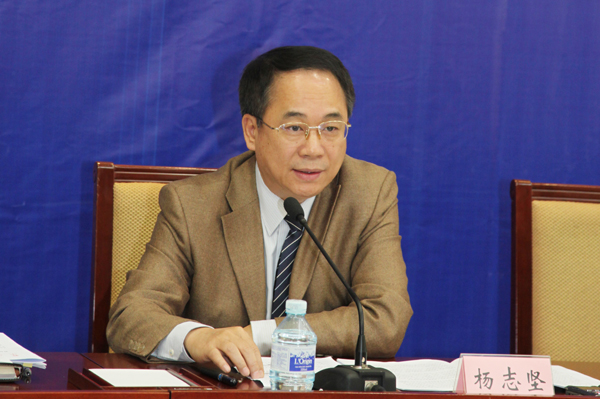 On March 24, 2016, the Ministry of Education (MOE) held a press conference to introduce the Action Plan for the Boosting Education and Ability Programme for Migrant Workers:“Realizing Dreams of Further Education”.
On March 24, 2016, the Ministry of Education (MOE) held a press conference to introduce the Action Plan for the Boosting Education and Ability Programme for Migrant Workers:“Realizing Dreams of Further Education”.
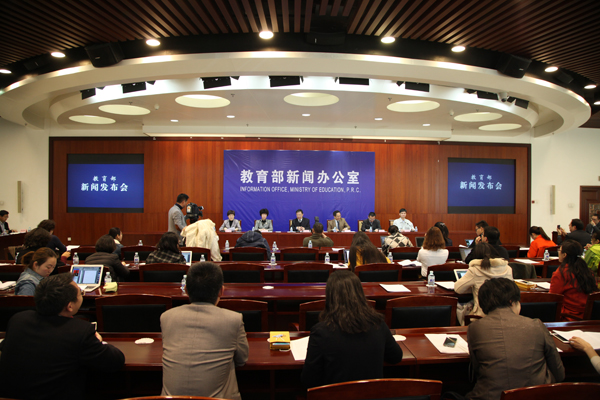 Attendees of the meeting included Director of the MOE Department of Vocational and Adult Education, Ge Daokai, Deputy Director Liu Jiantong, Deputy Director of the Publicity and Education Department of the All China Federation of Trade Unions (ACFTU), Wan Zhenli, President of the Open University of China(OUC) Yang Zhijian, and representative of migrant workers, Wu Qinde. At the conference, a service platform was officially launched for the “Action Plan of Realizing Dreams of Further Education”.
Attendees of the meeting included Director of the MOE Department of Vocational and Adult Education, Ge Daokai, Deputy Director Liu Jiantong, Deputy Director of the Publicity and Education Department of the All China Federation of Trade Unions (ACFTU), Wan Zhenli, President of the Open University of China(OUC) Yang Zhijian, and representative of migrant workers, Wu Qinde. At the conference, a service platform was officially launched for the “Action Plan of Realizing Dreams of Further Education”.
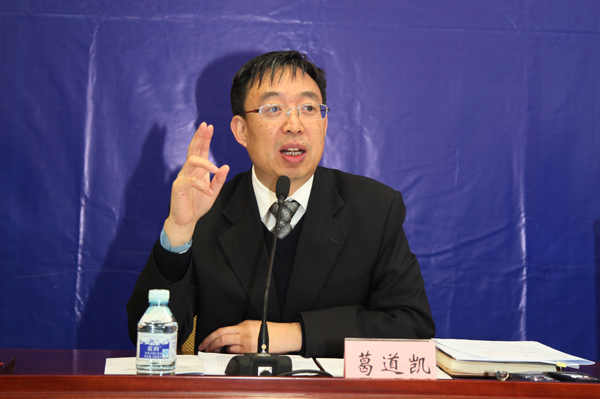 Director Ge Daokai introduced the general outline of the Action Plan for the Boosting Education and Ability Programme for Migrant Workers: “Realizing Dreams of Further Education (herein referred to as the“programme”). He pointed out that strengthening continuing education for migrant workers so they can master certain skills is of great significance in supporting economic and social development and transformation of and upgrades to industrial structure, whilst also helping migrant workers find stable jobs in cities and raising their happiness index and sense of achievement. Thus it is a people's livelihood project to serve the national development strategy and promote social justice and harmony. The programme includes five key tasks: First, to enhance the level of education of migrant workers and improve their professional skills; Second, to enhance the work competence of migrant workers so as to promote industrial restructuring; Third, to enhance migrant workers’ innovative and entrepreneurial capacity and offer help for the mass innovation and business startup initiative; Fourth, to enhance the comprehensive cultural education of migrant workers so that they can better assimilate into urban life; Fifth, to open quality network resources to boost lifelong learning. For these purposes, he also put forward the following safeguarding measures: First, to develop a college-enterprise collaboration training model; Second, to establish a mixed teaching model based on digitization; Third, to set up a joint working mechanism between the government, industries, colleges and enterprises; Fourth, to build up a diversified quality guarantee system for continuing education for migrant workers.
Director Ge Daokai introduced the general outline of the Action Plan for the Boosting Education and Ability Programme for Migrant Workers: “Realizing Dreams of Further Education (herein referred to as the“programme”). He pointed out that strengthening continuing education for migrant workers so they can master certain skills is of great significance in supporting economic and social development and transformation of and upgrades to industrial structure, whilst also helping migrant workers find stable jobs in cities and raising their happiness index and sense of achievement. Thus it is a people's livelihood project to serve the national development strategy and promote social justice and harmony. The programme includes five key tasks: First, to enhance the level of education of migrant workers and improve their professional skills; Second, to enhance the work competence of migrant workers so as to promote industrial restructuring; Third, to enhance migrant workers’ innovative and entrepreneurial capacity and offer help for the mass innovation and business startup initiative; Fourth, to enhance the comprehensive cultural education of migrant workers so that they can better assimilate into urban life; Fifth, to open quality network resources to boost lifelong learning. For these purposes, he also put forward the following safeguarding measures: First, to develop a college-enterprise collaboration training model; Second, to establish a mixed teaching model based on digitization; Third, to set up a joint working mechanism between the government, industries, colleges and enterprises; Fourth, to build up a diversified quality guarantee system for continuing education for migrant workers.
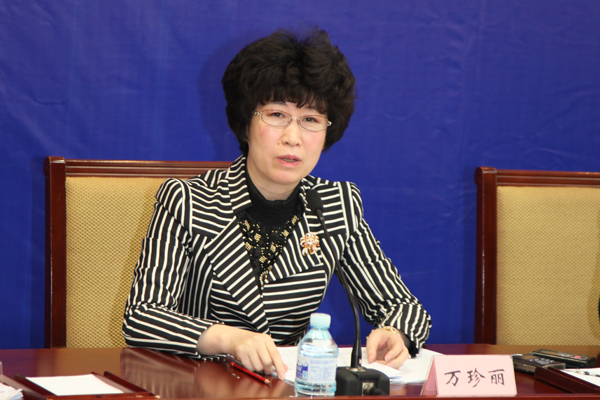 Deputy Director Wan Zhenli briefed attendees on the work of trade unions in supporting improvements to migrant workers’education and abilities. She pointed out that the ACFTU has always paid great attention to work aimed at upgrading education and abilities for the majority of workers, including migrant workers. In order to improve the overall quality of the workforce, on April 13, 2010, the ACFTU prepared and released the Five Year Plan(2010 - 2014) of the Project of Quality Construction for Employees Nationwide, which proposed to “develop skills upgrade training, vocational skills training, business startup training and skills training for reserved workforces which are focused on workers in enterprises with difficulties, migrant workers, the unemployed and green hand labours, to improve their ability to find employment”. On April 15, 2015, the ACFTU formulated and issued the next Five Year Plan (2015 - 2019) of the Project of Quality Construction for Employees Nationwide, which promoted the implementation of the“Assistance Plan to Help Migrant Workers Realize Their Dream to Pursue Studies”, advocating supporting migrant workers to improve their educational level through preferential policies, tuition assistance, the implementation of credit accumulation and via other flexible means. Other education training models will also be promoted which can adapt to the features of migrant workers’ positions and their actual needs, such as the“Credit Bank” and the “Modern Apprenticeship”, so that migrant workers will have a variety of ways to accept continuing education.
Deputy Director Wan Zhenli briefed attendees on the work of trade unions in supporting improvements to migrant workers’education and abilities. She pointed out that the ACFTU has always paid great attention to work aimed at upgrading education and abilities for the majority of workers, including migrant workers. In order to improve the overall quality of the workforce, on April 13, 2010, the ACFTU prepared and released the Five Year Plan(2010 - 2014) of the Project of Quality Construction for Employees Nationwide, which proposed to “develop skills upgrade training, vocational skills training, business startup training and skills training for reserved workforces which are focused on workers in enterprises with difficulties, migrant workers, the unemployed and green hand labours, to improve their ability to find employment”. On April 15, 2015, the ACFTU formulated and issued the next Five Year Plan (2015 - 2019) of the Project of Quality Construction for Employees Nationwide, which promoted the implementation of the“Assistance Plan to Help Migrant Workers Realize Their Dream to Pursue Studies”, advocating supporting migrant workers to improve their educational level through preferential policies, tuition assistance, the implementation of credit accumulation and via other flexible means. Other education training models will also be promoted which can adapt to the features of migrant workers’ positions and their actual needs, such as the“Credit Bank” and the “Modern Apprenticeship”, so that migrant workers will have a variety of ways to accept continuing education.
 President Yang Zhijian introduced the OUC’s work in implementing degree education for migrant workers and non-degree training. He pointed out that, over the years, the OUC, adhering to the mission of promoting lifelong learning for all, has paid special attention to the educational needs and development of the grassroots, rural areas, boundary areas and areas with ethnic minorities, as well as undertaking more social responsibilities at the national level to advance educational and social equity. As of 2004, in order to meet the needs of the development of modern agriculture and rural areas, the OUC undertook work as part of the MOE’s “One College Student Per Village” programme, in which it organized 1,380 tutorial centres throughout the nation and enrolled a total of 520,000 learners, making due contributions to the training of new professional farmers and the construction of modern agriculture in China. In 2014, with the aim of boosting the development of industrial transformation and upgrading and promoting the development of employees, the OUC launched and implemented the “Assistance Plan for the Training and Development of New Industrial Workers” and made proactive explorations in the integration of degree and non-degree continuing education, as well as in adjoining modern vocational and continuing education. They also researched the interconnection between online and offline learning and a new learner development model of integration of industries and education, which have all optimized the effective integration of education with Internet+ and yielded good results. In 2015, with the guidance and support of the ACFTU, the OUC cooperated with the Guangdong Provincial Federation of Trade Unions to jointly develop the “Big Training Initiative for 10 Million Workers” for employees in Guangdong Province and the “Guangdong model” was initially formed, which has accumulated experiences and explored a new path for spreading the Assistance Plan across the country. These are mainly described as follows:
President Yang Zhijian introduced the OUC’s work in implementing degree education for migrant workers and non-degree training. He pointed out that, over the years, the OUC, adhering to the mission of promoting lifelong learning for all, has paid special attention to the educational needs and development of the grassroots, rural areas, boundary areas and areas with ethnic minorities, as well as undertaking more social responsibilities at the national level to advance educational and social equity. As of 2004, in order to meet the needs of the development of modern agriculture and rural areas, the OUC undertook work as part of the MOE’s “One College Student Per Village” programme, in which it organized 1,380 tutorial centres throughout the nation and enrolled a total of 520,000 learners, making due contributions to the training of new professional farmers and the construction of modern agriculture in China. In 2014, with the aim of boosting the development of industrial transformation and upgrading and promoting the development of employees, the OUC launched and implemented the “Assistance Plan for the Training and Development of New Industrial Workers” and made proactive explorations in the integration of degree and non-degree continuing education, as well as in adjoining modern vocational and continuing education. They also researched the interconnection between online and offline learning and a new learner development model of integration of industries and education, which have all optimized the effective integration of education with Internet+ and yielded good results. In 2015, with the guidance and support of the ACFTU, the OUC cooperated with the Guangdong Provincial Federation of Trade Unions to jointly develop the “Big Training Initiative for 10 Million Workers” for employees in Guangdong Province and the “Guangdong model” was initially formed, which has accumulated experiences and explored a new path for spreading the Assistance Plan across the country. These are mainly described as follows:
Five integrations have been explored and implemented, namely, the integration of the allocation of specialties with industrial demands, curriculum content with vocational standards, the teaching process with the production process, the graduation certificates with occupational qualification certificates, and vocational education with lifelong learning. A number of specialties relating to modern manufacturing and production service industries have been introduced,which are oriented for the economic and social development model in Guangdong and for supporting industrial transformation and upgrades in the province. The Double Certificates transformation was achieved by introducing job skills training certificates and national occupational qualification certificates. Two new patterns of learning of “Delivering Education to Enterprises” and “Learning without Leaving the Job”, an incentive mechanism of “Entering into Colleges with Government Subsidies”, and a new learning model of internet based “Integration of Six Networks”, were explored, which has helped a lot of industrial workers realize their dream of entering further education.
Yang Zhijian noted that the OUC will conscientiously implement the various requirements of the programme. Under the direct leadership of the MOE and the ACFTU, and relying on its organization system which covers both urban and rural areas throughout the nation, it will deepen cooperation with local federations of trade unions in a comprehensive way, upgrade the“One College Student Per Village”programme and “Assistance Plan”, take great efforts to make progress in non-degree education, emphasizing improving job skills for the majority of migrant workers, and make steady progress in promoting degree education with higher continuing education as the core.
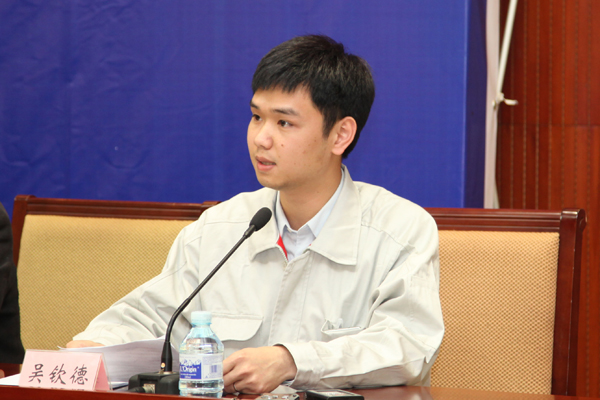 Migrant worker Wu Qinde from the Passenger Vehicle Company of Guangzhou Automobile Group Co., Ltd. shared with others his own learning experiences.
Migrant worker Wu Qinde from the Passenger Vehicle Company of Guangzhou Automobile Group Co., Ltd. shared with others his own learning experiences.
The major objectives of the “Boosting Education and Ability Programme for Migrant Workers” are to establish a new continuing education model in which degree and non-degree education are paid equal attention, production is integrated with education, colleges cooperate with enterprises and work is combined with studies, particularly for migrant workers, to enhance their level of education and technical skills and to help them work decently and live happily. These changes will also provide effective services for economic and social development and industrial structure transformation and upgrades. It is hoped that by 2020, 1.5 million migrant workers who require academic upgrading and who are qualified for admission will be supported to receive degree continuing education and that every migrant worker will have access to corresponding technical skill training and will be able to improve their own professional abilities through free and open learning courses.
Various media outlets including Economic Daily, China Education Daily, China Reform Daily, Ta Kung Pao, China Central Television etc. covered the news conference.
By Yu Minsheng, OUC